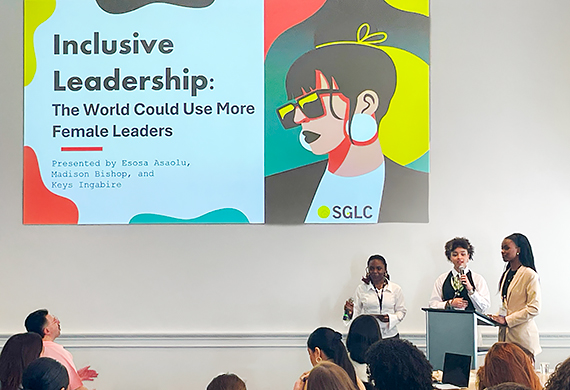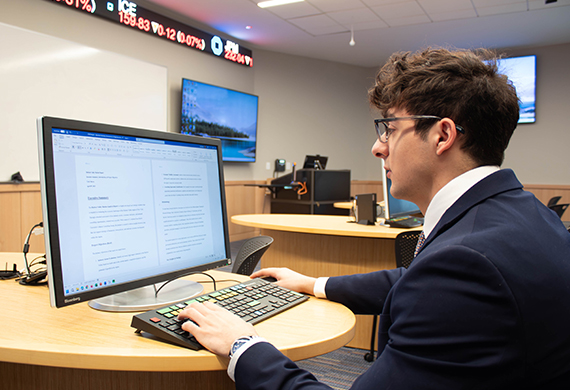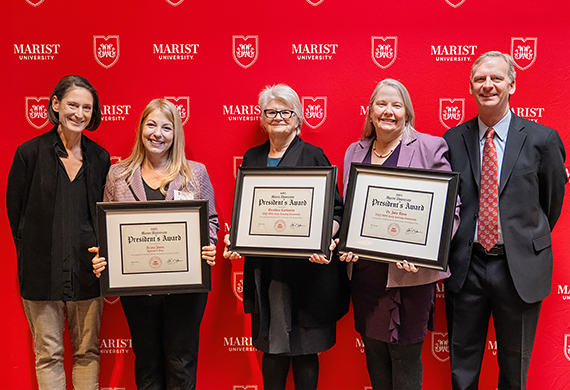Comics are Serious Work at Marist

October 30, 2023 — Of the most banned and challenged books from 2010-2019, over a dozen were comics. More than 20 additional books on American Library Association's banned book list were illustrated in some way.
If these facts pique your curiosity, you’re not alone. Comics spark original research, inspire interactive presentations, prompt trips to festivals, and help Marist students and faculty grasp complex social and political issues.
“You have contemporary concerns about book burning, and censorship in libraries. A lot of this is about comics,” said Dr. Henry Pratt, Associate Professor of philosophy, whose book The Philosophy of Comics: What They Are, How They Work, and Why They Matter was published earlier this year by Oxford University Press.
“We sometimes tend to think that comics are not serious or sophisticated,” said Dr. Moira Fitzgibbons, Professor of English. “But students are very quick to pick up on their topical relevance.”
Dr. Moira Fitzgibbons reads the graphic novel Everything is an Emergency by Jason Adam Katzenstein on the campus green. Photo by Nelson Echeverria/Marist College.
Dr. Fitzgibbons teaches two courses that center on comics, and students like Shania Fernandez '26 were drawn in through them.
“We learned how comics, as a literary medium, can tell readers so much more about what they are trying to portray than what appears on the surface,” said Fernandez, who took Dr. Fitzgibbons’ Minds and Bodies in Comics course.
Armed with this knowledge, Fernandez and several peers helped lead an interactive exhibit at the recent Explorations in Social Justice conference about how comics represent disability. To counter negative stereotypes, participants were asked to draw the word “disability” in a positive light.
Students create illustrations at the Comics and Disability exhibit, part of the Explorations in Social Justice conference in September. Photo by Nelson Echeverria/Marist College.
“The prompt was a good segue into the conversation about how disability is depicted, and the complexity of the way illustrations are constructed when there is deeper meaning behind it,” Fernandez said.
“It was really awesome to see everyone’s creative ideas on the topic,” said Marin Rosman '26, who worked with Fernandez on the panel. “Most people don’t think much about the impact of telling a story through pictures.”
The vigorous academic engagement with comics takes students off campus, too. In April, a group of 12 undergraduates was joined by six students from the Liberty Partnerships Program along with faculty and staff coordinators to attend the Black Comic Book Festival in New York City, which featured the work of comic creators, scholars, and activists.
Students in New York City, attending the Black Comic Book Festival. Photo courtesy of Dr. Moira Fitzgibbons, Professor of English.
The festival opened students’ eyes to how comics deal with complex social issues.
“It blew my mind how these authors are using comics as way to show protest,” said Elisabet Guerrero Hernandez '25, who attended the event. “In these comics, there is a lot of deliberate storytelling of how people of color are treated and perceived in American society.”
“We had literature students, we had computer science students, we had artists,” said Dr. Fitzgibbons, who ran the trip alongside Dr. Magda Desgranges. “Different things bring different students to comics.”
Marist’s library offers students access to an extensive collection of comics, curated and organized by librarian Deborah Tomaras, which was started in 2019 and grew quickly, thanks to a generous donation from Buddy Scalera, the parent of a Marist student. Since then, the collection has grown to more than 700 titles, with a focus on diversity and social justice.
Displayed graphic novels as part of the comics collection at the Marist library. Photo by Nelson Echeverria/Marist College.
Recent additions include Sensory: Life on the Spectrum, a collection of comics by autistic artists, Wash Day Diaries, a comic about friendship, hair, and self-care among Black women, and Everything is OK, which deals with experiences of depression, mindfulness, and recovery.
Tomaras is an avid comic reader herself, and enjoys providing these opportunities for students.
“Comics can fulfill many functions, from pleasure reading, to class content, to scholarly research, and even counseling support,” Tomaras said. “I would be happy to suggest comics of potential interest to anyone in the Marist community.”
But what makes comics such a powerful mode of storytelling, so much so that they can end up being banned? Answers to questions like this are never straightforward, but in his book, Dr. Pratt poses deep questions about why comics can can be so potent.
Dr. Henry Pratt holds up his book, The Philosophy of Comics, recently published by Oxford University Press. Photo by Nelson Echeverria/Marist College.
“There’s something about pictures, right? In comics, artists will very deliberately manipulate the fact that you can't see the next page,” said Dr. Pratt. “So they'll withhold something from you, and then you get that page turn, and it can have tremendous impact.“
Dr. Pratt says comics have helped him challenge his students.
“I tell them, ‘You're not going to like some of this stuff. There’s going to be things in here you'll disagree with,'” he said. “I don't expect them to change, necessarily, although they may. But I want them to at least figure out if they aren't changing, why not?”
Dr. Fitzgibbons is also writing a book, Comics and Cartooning in the Hudson River Valley, due out in late 2024 from SUNY Press.
Additionally, Jeff Canino, Visiting Lecturer of English, has written several commercially successful comics, including the Besties series with co-author Kayla Miller. Comics also serve as a teaching tool for history professors like Dr. Kristin Bayer and Dr. Michael O’Sullivan who use them to help present vivid accounts of historical events.
“There’s a climate here at Marist that is supportive of this kind of research and teaching,” said Dr. Fitzgibbons. “It’s not an accident that this work is happening, and we’re testing out these ideas here.”



